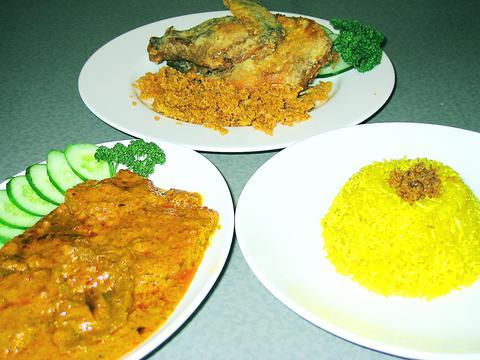Opened 11 years ago by Yang Man-yun (
Which is not really surprising, as Yang is a native of Malang, which according to Yang, is the home of Indonesian cooking. So genuine and highly regarded is the food that comes out of the Sate House's kitchen, in fact, that the place is a favorite with many of the better-connected Indonesian expats. On any given day high-ranking officials from the Indonesian Chamber of Commerce and the Indonesian Trade Office can been seen chowing down on traditional dishes in Yang's simple, yet comfortable dining area.

PHOTO: GAVIN PHIPPS, TAIPEI TIMES
In stark contrast to the multitude of SE Asian restaurants that litter Taipei with their glitzy interiors and same-same menus, the Sate House goes for a more homely look and an original menu.
A handful of obligatory Indonesian nick-knacks such as photographs and puppets adorn the walls, but apart from that the Sate House's interior is relatively sparse. Unlike the menu, which is packed with all sorts of mouthwatering Indonesian fair and the contrasting flavors of lemon grass, coconut milk, cilantro and various types of curry.
While there is no English on the menu -- preferring instead to use Chinese and Indonesian -- large photos of all the dishes make choosing your meal hassle-free. The menu is packed with everything from popular sates, which range in price from NT$180 to NT$250 and which come served with Yang's special sate dip, to lesser known dishes like udang pete (shrimp with rather potent Indonesian beans, NT$380).
To ensure all the dishes served up at the Sate House are as fresh as possible, Yang imports the multitude of spices needed on a weekly basis. All of which ensures that the food, be it ikan bakar (baked fish, NT$380 -- NT$450), rendang sapi (spicy beef, NT$220), ayum bumbu rujak (hot and spicy chicken, NT$220) or gado gado (Indonesian salad, NT$160), all tastes genuine.
Some of the Sate House's more popular dishes include udang goreng mentega (fried shrimp in black bean sauce, NT$380), Bali sapi (Bali beef, NT$220), tahu telor (egg and tofu salad, NT$160) and ayam goreng mentega (chicken in bean sauce, NT$280).
An interesting and highly unique way to finish off any meal at Sate House is to sample some of Yang's homemade durian-flavored ice cream (NT$80). While possibly not everyone's first choice of desserts, the Sate House's notoriously stinky fruit-flavored iced cream is, thankfully, odorless and remarkably tasty.

June 23 to June 29 After capturing the walled city of Hsinchu on June 22, 1895, the Japanese hoped to quickly push south and seize control of Taiwan’s entire west coast — but their advance was stalled for more than a month. Not only did local Hakka fighters continue to cause them headaches, resistance forces even attempted to retake the city three times. “We had planned to occupy Anping (Tainan) and Takao (Kaohsiung) as soon as possible, but ever since we took Hsinchu, nearby bandits proclaiming to be ‘righteous people’ (義民) have been destroying train tracks and electrical cables, and gathering in villages

Dr. Y. Tony Yang, Associate Dean of Health Policy and Population Science at George Washington University, argued last week in a piece for the Taipei Times about former president Ma Ying-jeou (馬英九) leading a student delegation to the People’s Republic of China (PRC) that, “The real question is not whether Ma’s visit helps or hurts Taiwan — it is why Taiwan lacks a sophisticated, multi-track approach to one of the most complex geopolitical relationships in the world” (“Ma’s Visit, DPP’s Blind Spot,” June 18, page 8). Yang contends that the Democratic Progressive Party (DPP) has a blind spot: “By treating any

Swooping low over the banks of a Nile River tributary, an aid flight run by retired American military officers released a stream of food-stuffed sacks over a town emptied by fighting in South Sudan, a country wracked by conflict. Last week’s air drop was the latest in a controversial development — private contracting firms led by former US intelligence officers and military veterans delivering aid to some of the world’s deadliest conflict zones, in operations organized with governments that are combatants in the conflicts. The moves are roiling the global aid community, which warns of a more militarized, politicized and profit-seeking trend

This year will go down in the history books. Taiwan faces enormous turmoil and uncertainty in the coming months. Which political parties are in a good position to handle big changes? All of the main parties are beset with challenges. Taking stock, this column examined the Taiwan People’s Party (TPP) (“Huang Kuo-chang’s choking the life out of the TPP,” May 28, page 12), the Democratic Progressive Party (DPP) (“Challenges amid choppy waters for the DPP,” June 14, page 12) and the Chinese Nationalist Party (KMT) (“KMT struggles to seize opportunities as ‘interesting times’ loom,” June 20, page 11). Times like these can